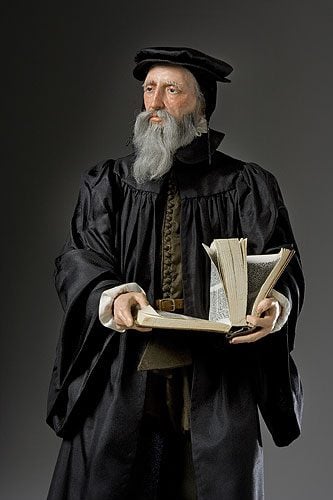
This is an installment of a series of replies (see the Introduction and Master List) to much of Book IV (Of the Holy Catholic Church) of Institutes of the Christian Religion, by early Protestant leader John Calvin (1509-1564). I utilize the public domain translation of Henry Beveridge, dated 1845, from the 1559 edition in Latin; available online. Calvin’s words will be in blue. All biblical citations (in my portions) will be from RSV unless otherwise noted.
Related reading from yours truly:
Biblical Catholic Answers for John Calvin (2010 book: 388 pages)
A Biblical Critique of Calvinism (2012 book: 178 pages)
Biblical Catholic Salvation: “Faith Working Through Love” (2010 book: 187 pages; includes biblical critiques of all five points of “TULIP”)
*****
IV, 1:18-19
***
CHAPTER 1.
OF THE TRUE CHURCH. DUTY OF CULTIVATING UNITY WITH HER, AS THE MOTHER OF ALL THE GODLY.
18. Another confirmation from the example of Christ and of the faithful servants of God. The appearance of the Church in the days of the prophets.
On this head, Christ himself, his apostles, and almost all the prophets, have furnished us with examples. Fearful are the descriptions in which Isaiah, Jeremiah, Joel, Habakkuk, and others, deplore the diseases of the Church of Jerusalem. In the people, the rulers, and the priests, corruption prevailed to such a degree, that Isaiah hesitates not to liken Jerusalem to Sodom and Gomorrah (Isa. 1:10). Religion was partly despised, partly adulterated, while in regard to morals, we everywhere meet with accounts of theft, robbery, perfidy, murder, and similar crimes. The prophets, however, did not therefore either form new churches for themselves, or erect new altars on which they might have separate sacrifices, but whatever their countrymen might be, reflecting that the Lord had deposited his word with them, and instituted the ceremonies by which he was then worshipped, they stretched out pure hands to him, though amid the company of the ungodly.
Exactly. Why, then, did Luther and Calvin choose to separate from the Church in their day? He lays out the correct biblical principle and understanding of corruption in relation to the true Church, but then does the exact opposite in his own actions. This will always remain an eternal mystery, I guess, because I’ve yet to find any place where either man grapples with this inconsistency directly and attempts to rationalize it: to explain why early Protestantism took the course that it took. Moreover, I rarely ever find current-day Protestants who squarely face the problem. I submit that this is because there truly is no good rationale for schism and division. It’s simply accepted as a sort of “necessary evil.”
Certainly, had they thought that they thereby contracted any pollution, they would have died a hundred deaths sooner than suffered themselves to be dragged thither. Nothing, therefore, prevented them from separating themselves, but a desire of preserving unity.
Well said!
But if the holy prophets felt no obligation to withdraw from the Church on account of the very numerous and heinous crimes, not of one or two individuals, but almost of the whole people, we arrogate too much to ourselves, if we presume forthwith to withdraw from the communion of the Church, because the lives of all accord not with our judgment, or even with the Christian profession.
No Catholic could have stated it better. The difference is that we truly live by Calvin’s advice, and respect the unity and oneness of the Church. But Calvin departs from his own advice. He talks the talk but doesn’t walk the walk. He may play games and try to redefine the historic Church, to pretend that he hasn’t departed from it, but that won’t fly, as I will repeatedly attempt to demonstrate throughout my replies. These issues truly lie at the heart of the Catholic-Protestant divide. I never properly grappled with them myself when I was a Protestant, but now I can do so, and do indeed do so, because I have Scripture, history and reason on my side and have nothing to fear in facing all of them and accepting what they are.
19. Appearance of the Church in the days of Christ and the apostles, and their immediate followers.
Then what kind of age was that of Christ and the apostles? Yet neither could the desperate impiety of the Pharisees, nor the dissolute licentiousness of manners which everywhere prevailed,
A lot like today and all ages, in other words . . .
prevent them from using the same sacred rites with the people, and meeting in one common temple for the public exercises of religion. And why so, but just because they knew that those who joined in these sacred rites with a pure conscience were not at all polluted by the society of the wicked? If any one is little moved by prophets and apostles, let him at least defer to the authority of Christ. Well, therefore, does Cyprian say, “Although tares or unclean vessels are seen in the Church, that is no reason why we ourselves should withdraw from the Church; we must only labour that we may be able to be wheat; we must give our endeavour, and strive as far as we can, to be vessels of gold or silver. But to break the earthen vessels belongs to the Lord alone, to whom a rod of iron has been given: let no one arrogate to himself what is peculiar to the Son alone, and think himself sufficient to winnow the floor and cleanse the chaff, and separate all the tares by human judgment. What depraved zeal thus assumes to itself is proud obstinacy and sacrilegious presumption” (Cyprian, Lib. 3 Ep. 5).
Amen!
Let both points, therefore, be regarded as fixed; first, that there is no excuse for him who spontaneously abandons the external communion of a church in which the word of God is preached and the sacraments are administered; secondly, that notwithstanding of the faults of a few or of many, there is nothing to prevent us from there duly professing our faith in the ordinances instituted by God, because a pious conscience is not injured by the unworthiness of another, whether he be a pastor or a private individual; and sacred rites are not less pure and salutary to a man who is holy and upright, from being at the same time handled by the impure.
This is the same stand that the Church took throughout the centuries, exemplified particularly in St. Augustine’s rebuke of the schismatic Donatists. The teaching is correct, but Calvin and Protestants in general have, unfortunately, not lived by it. At least it is most refreshing to see Calvin reason in this fashion.
Today’s Protestants usually would not present their position in these terms, because it seems too obviously “Catholic.” They have the benefit of hindsight and knowledge of what the Protestant principle of authority has actually wrought in real life. And that causes them to often depart in modes of thought and practice from the founders of their schools of thought. This is very common and constantly evident in comparing the arguments and presentation of today’s Protestants to the early ones and originators of the system(s).
***
(originally 5-15-09; rev. 12-19-18)
Photo credit: Historical mixed media figure of John Calvin produced by artist/historian George S. Stuart and photographed by Peter d’Aprix: from the George S. Stuart Gallery of Historical Figures archive [Wikimedia Commons / Creative Commons Attribution-Share Alike 3.0 Unported license]













